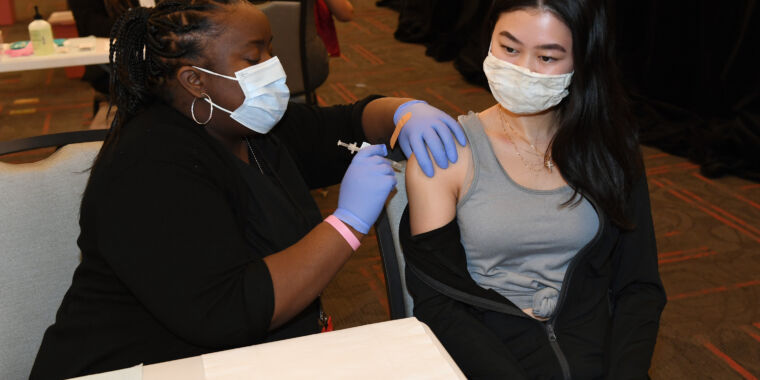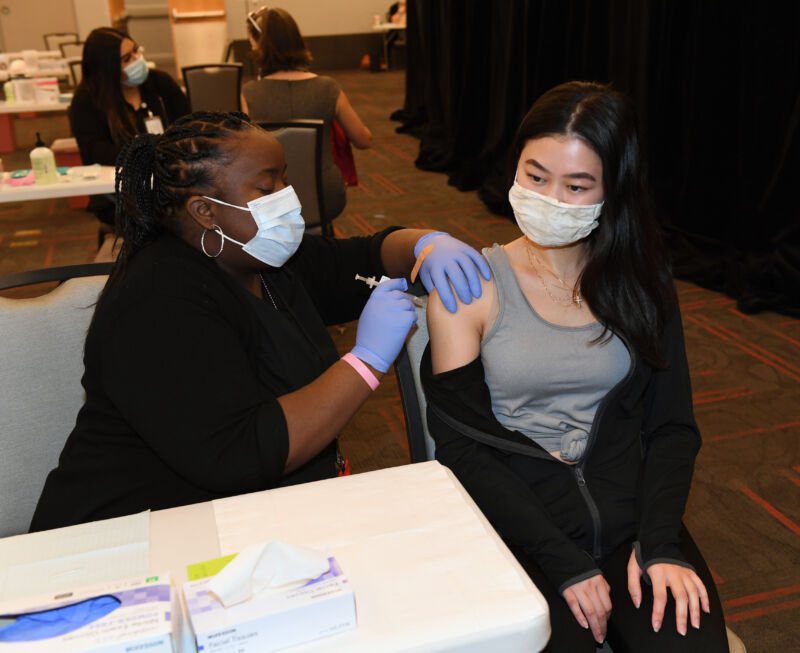
Get vaccinated —
Common symptoms among young adults included fatigue and cognitive problems.

Enlarge / A UNLV Medicine medical assistant administers a Pfizer-BioNTech COVID-19 vaccination to a UNLV School of Nursing student.
Even mild cases of COVID-19 in young people often lead to lingering symptoms and health complications that drag on for six months or longer, according to a small Norwegian study published this week in Nature Medicine.
Researchers at the University of Bergen carefully followed 312 people with confirmed cases of COVID-19 for at least six months. Of those, 247 had mild to moderate illnesses and isolated at home, never becoming sick enough to be admitted to a hospital. Six months after testing positive, 136 of the 247 (55 percent) still had lingering symptoms. And those 136 weren’t only in the older age groups. In fact, in all the age groups between 16 and over 60 years old, between 50 percent and 60 percent of COVID patients reported persistent symptoms.
For instance, of those between 16 and 30 years old, 52 percent (32 of 61) still suffered COVID-19 symptoms after six months. The most common symptoms were disturbed taste and/or smell, fatigue, difficulty breathing, difficulty concentrating, and memory problems.
The study is small, and the exact percentages may not hold up in larger studies. However, it adds to a growing body of data finding that long-term symptoms from COVID-19 are common—even in young people and/or people who had mild or even asymptomatic disease.
In a non-peer-reviewed preprint study posted in March, researchers found that a third of the patients identified through medical records as suffering from so-called “long-haul” COVID-19 had initially reported asymptomatic cases. The study’s authors, led by researchers in California, tracked the electronic medical records of 1,407 patients who had tested positive for the coronavirus, but these individuals were not sick enough to be hospitalized when they were infected. Of the 1,407, about 27 percent—382 people—developed long-term symptoms, and a third of them were initially asymptomatic.
Likewise, in another study posted this month, researchers tracked health insurance records of nearly two million people who tested positive for the coronavirus. The researchers found that about 23 percent of the patients sought care for a new post-COVID medical condition one or more months later. Of the people who had mild to moderate cases of COVID-19 that didn’t require hospitalization, 27 percent experienced persistent symptoms, as did 19 percent of people who initially reported asymptomatic cases.
The authors of the Norwegian study expressed concern about finding mild cases in young people leading to long-term problems. “It is worrying that non-hospitalized, young people (16–30 years old) suffer potentially severe symptoms, such as concentration and memory problems, dyspnea and fatigue, half a year after infection,” the authors wrote. “Particularly for students, such symptoms might interfere with their learning and study progress… Considering the millions of young people infected during the ongoing pandemic, our findings are a strong impetus for comprehensive infection control and population-wide mass vaccination.”
No comments:
Post a Comment